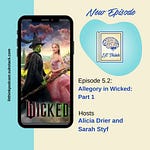Alicia and Sarah expand their understanding of science fiction through the unconventional time travel story in Octavia Butler’s Kindred. They discuss how the Hulu adaptation has updated the forty-year-old novel while still challenging audiences to consider the lasting effects of slavery on our modern consciousness. At the end of this week’s discussion, they talk about the things they've been reading, watching, and analyzing outside of the classroom.
Literary terms of the week: speculative fiction, utopian fiction, visionary fiction
Sign up for the newsletter and follow us on Instagram and Facebook.
Music by Craig Harmann
Cover art by Matt Holman
Show Notes:
30-second summary
Why Kindred?
Original book published in 1979
TV miniseries in 2022
Octavia Butler’s influence on science fiction
Also great podcast episode of Butler’s short fiction here
Literary terms of the week (plus historical context):
Speculative fiction
Science Fiction
Utopian Fiction
Visionary Fiction
What if?
Unfamiliar setting
Innovative tech
Relatable characters
Themes about humanity
Visionary Fiction: “Visionary fiction is…fantastical writing that helps us imagine new just worlds. Visionary fiction encompasses science fiction, fantasy, horror, magical realism, alternative timelines, and more. It is fantastical literature that helps us to understand existing power dynamics, and helps us imagine paths to creating more just futures.”
“When readers who are White, middle class, cisgender, heterosexual, and able-bodied enter the fantastic dream, they are empowered and afforded a sense of transcendence that can be elusive within the real world. If this is the case, then readers and hearers of fantastic tales who have been endarkened and Othered by the dominant culture can never be plausible conquering heroes nor prizes to be won in the fantastic. Unless the tale is meant to be comedic, tongue-in-cheek, a wink and a nod that breaks the fourth wall and assures audiences that this is a parody of the fantastic, not the real story…
“...the implicit message that readers, hearers, and viewers of color receive as they read these texts is that we are the villains. We are the horde. We are the enemies.
“We are the monsters.”
Through a Looking Glass, Darkly: Theorizing Fantasy from the Monster’s Point of View, by Ebony Elizabeth Thomas
Tips for discussing racism in the classroom:
Develop a classroom contract on how you will address a hard topic together
Consider the following questions from this PBS lesson plan:
From what starting place are your students approaching this conversation?
Do your students feel they can trust you and each other?
Prepare for uncomfortable moments. What will you do?
How can you respect and protect students who may feel pressure to share personal or even traumatic experiences? Consider what personal risks students may be taking in sharing such experiences and prepare accordingly.
How can you frame discussions of race in the classroom in a way that takes pressure off of BIPOC ( = Black, Indigenous, People of Color) students to speak on behalf of their communities?
Note: We recorded this episode shortly after the release of the Tyre Nichols video.
What are we enjoying right now?
Alicia: National Treasure: Edge of History (TV on Disney+), Even Though I Knew the End (CL Polk)
Sarah: The Great Alone by Kristin Hannah (book), A Man Called Otto (movie)
Related Episodes
Please “like” by clicking on the ❤ and share this post with your friends, colleagues, and fellow lit thinkers.















Share this post